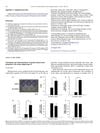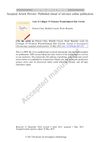8 citations,
November 2019 in “Clinical Science” High DHA levels delay wound healing and worsen skin repair quality.
 95 citations,
February 2018 in “Dermatology and Therapy”
95 citations,
February 2018 in “Dermatology and Therapy” Nutraceuticals may improve skin health and protect against aging, but more research is needed on their optimal use and possible health risks.
 3 citations,
January 2020 in “Plastic and Aesthetic Research”
3 citations,
January 2020 in “Plastic and Aesthetic Research” Non-surgical procedures can help reduce wrinkles and stimulate skin repair by understanding skin aging at the molecular level.
 July 2022 in “The journal of investigative dermatology/Journal of investigative dermatology”
July 2022 in “The journal of investigative dermatology/Journal of investigative dermatology” Scientists improved how to make skin-like structures from stem cells using special gels and a device that controls growth signals, leading to better hair and skin features.

The review found that PRP is the most effective treatment for hair loss with few side effects.
 January 2022 in “International Journal of Nutrology”
January 2022 in “International Journal of Nutrology” Diet and nutrients, including lycopene from tomatoes and hydroquinone from wheat, can help control melasma, a skin condition.
 August 2024 in “Quality in Sport”
August 2024 in “Quality in Sport” New treatments for common hair loss are needed.

Stem cell therapy is more effective than minoxidil for hair growth in androgenic alopecia.
 July 2023 in “British journal of dermatology/British journal of dermatology, Supplement”
July 2023 in “British journal of dermatology/British journal of dermatology, Supplement” Skin tumors with CYLD cutaneous syndrome show more NF-κB activity and less organized collagen.
 11 citations,
June 2012 in “Journal of Dermatological Science”
11 citations,
June 2012 in “Journal of Dermatological Science” Scientists identified a group of human skin cells with high growth and regeneration potential.
16 citations,
February 2005 in “British journal of dermatology/British journal of dermatology, Supplement” Lack of Vitamin D receptor changes skin structure and increases certain immune cells in the skin.
 July 2023 in “British journal of dermatology/British journal of dermatology, Supplement”
July 2023 in “British journal of dermatology/British journal of dermatology, Supplement” Aging changes scalp cells, possibly affecting hair health in older women.
 11 citations,
September 2007 in “Advances in therapy”
11 citations,
September 2007 in “Advances in therapy” INVERSION Femme supplement helped women lose weight, reduce hair loss, and improve skin and nail health.
 9 citations,
September 2018 in “Clinical, Cosmetic and Investigational Dermatology”
9 citations,
September 2018 in “Clinical, Cosmetic and Investigational Dermatology” One supplement improved hair loss and quality faster and more effectively than the other in treating telogen effluvium.
 3 citations,
June 2017 in “Aesthetic plastic surgery”
3 citations,
June 2017 in “Aesthetic plastic surgery” The new facial treatment improved wrinkles and skin thickness, with most patients seeing results within a month, despite some temporary swelling and bruising.
 2 citations,
July 2018 in “Elsevier eBooks”
2 citations,
July 2018 in “Elsevier eBooks” Some supplements may help with hair loss, but there's not enough strong evidence to recommend them without doctor advice.
 38 citations,
January 2015 in “Journal of Cosmetic Dermatology”
38 citations,
January 2015 in “Journal of Cosmetic Dermatology” The nutritional supplement improved hair density and reduced hair loss in women with female pattern hair loss.
 38 citations,
June 2005 in “Matrix Biology”
38 citations,
June 2005 in “Matrix Biology” Minoxidil affects collagen-related genes, potentially helping treat fibrosis.
 37 citations,
January 2019 in “Dermatologic Therapy”
37 citations,
January 2019 in “Dermatologic Therapy” A dietary supplement with Boswellia serrata, Curcuma longa, and Vitis vinifera showed potential improvement in hair health for telogen effluvium patients, but more research is needed.
 32 citations,
May 2015 in “Journal of Investigative Dermatology”
32 citations,
May 2015 in “Journal of Investigative Dermatology” Mice without collagen VI have slower hair growth normally but faster regrowth after injury.
 23 citations,
July 1996 in “Archives of Dermatological Research”
23 citations,
July 1996 in “Archives of Dermatological Research” bFGF, VEGF, and minoxidil decrease collagen production in hair cells, possibly affecting hair growth.
 11 citations,
January 2015 in “Skin pharmacology and physiology”
11 citations,
January 2015 in “Skin pharmacology and physiology” Eating collagen peptides may help with skin and hair growth.
 3 citations,
November 2020 in “Planta medica international open”
3 citations,
November 2020 in “Planta medica international open” Plant-made bFGF helps cells grow and boosts collagen.
 1 citations,
May 2023 in “Frontiers in endocrinology”
1 citations,
May 2023 in “Frontiers in endocrinology” A new MBTPS2 gene variant disrupts fat metabolism and collagen production, causing Osteogenesis imperfecta.
 April 2016 in “Plastic and reconstructive surgery. Global open”
April 2016 in “Plastic and reconstructive surgery. Global open” The supplement highlighted advancements and challenges in plastic and reconstructive surgery, including the impact of smoking, chemotherapy, and new treatments like Tafluprost for hair loss.
 5 citations,
July 2018 in “Pediatrics”
5 citations,
July 2018 in “Pediatrics” A 3-year-old girl developed scurvy symptoms that improved with vitamin C but relapsed when supplementation stopped.
 3 citations,
January 2017 in “Journal of cosmetology & trichology”
3 citations,
January 2017 in “Journal of cosmetology & trichology” The food supplement with L-cystine, Serenoa repens extract, and biotin safely reduced hair loss and improved hair growth in men and women.
 1 citations,
August 2004 in “Alternative & complementary therapies”
1 citations,
August 2004 in “Alternative & complementary therapies” Non-drug methods like diet, supplements, and aromatherapy can help manage hair loss and its emotional impact.
 124 citations,
March 2012 in “JAMA”
124 citations,
March 2012 in “JAMA” Testosterone's muscle-building effects do not require its conversion to DHT.
 24 citations,
June 2010 in “Clinics in Dermatology”
24 citations,
June 2010 in “Clinics in Dermatology” Taking too many vitamin and mineral supplements can cause serious health problems.



























